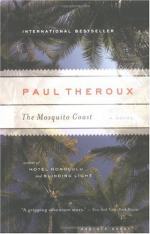|
This section contains 294 words (approx. 1 page at 400 words per page) |

|
By using a young first-person narrator, Theroux creates an effective point of view from which to observe Father's character. Readers experience the tension and ambivalence that Charlie feels, and alternately laugh and shudder at Allie's words. Charlie proves a faithful reporter, honest and less critical than the other children. His relationship with Father is psychologically complex, because Charlie both fears and respects him and this lends considerable tension to the story. The sensitivity of Charlie's vision can also be seen in his descriptive powers as he makes the jungle come alive. Readers may feel slightly manipulated, however, because many passages reveal the professional hand of Theroux himself.
Charlie also lacks the personality and perspective of such entertaining firstperson narrators as Huck Finn or Jack Crabb from Thomas Berger's Little Big Man (1964).
Key episodes in The Mosquito Coast have biblical parallels. The leveling of Jeronimo recalls the destruction of...
|
This section contains 294 words (approx. 1 page at 400 words per page) |

|




